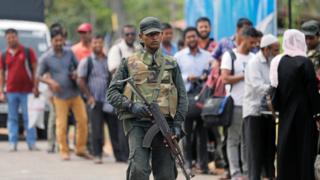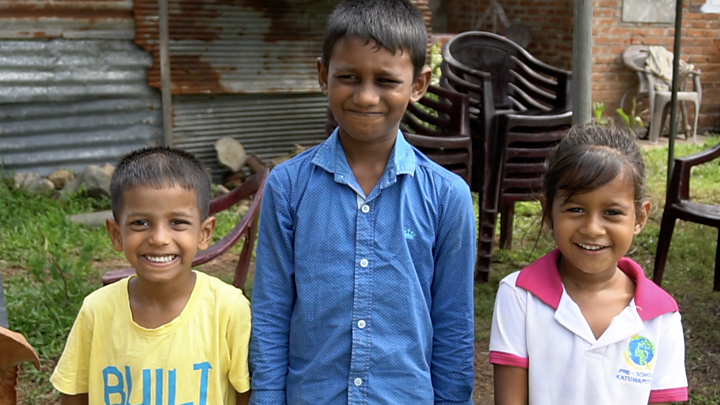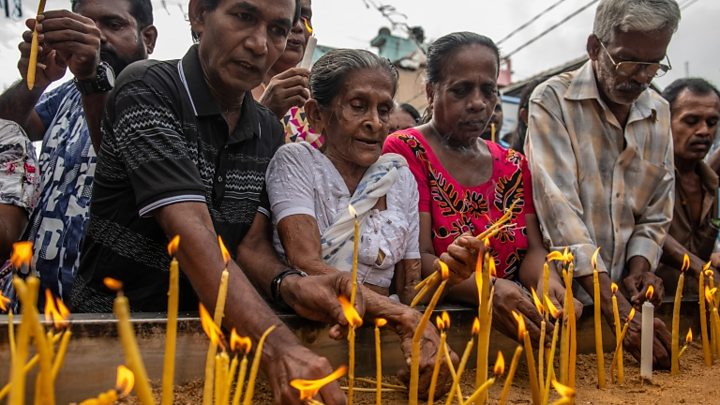Sri Lanka key suspect’s relatives killed
The father and two brothers of the alleged organiser of the Easter Sunday bombings in Sri Lanka, Zahran Hashim, were killed in a security forces operation on Friday, police say.
Hashim, who blew himself up at a hotel in the capital Colombo, founded an Islamist group, the NTJ, which has now been banned.
Police have raided the group’s HQ in the eastern town of Kattankudy.
The attacks targeted churches and hotels, killing at least 250 people.
Sunday church services are cancelled across the country as a precaution.
However, worshippers in the capital gathered to pray outside St Anthony’s, which was badly damaged in the attacks.
The country’s president and prime minister attended a televised Christian ceremony.
‘Safe house’ discovered by chance
By Anbarasan Ethirajan, BBC News, Sainthamaruthu
When I entered the house where the Islamists and their families were killed on Friday evening, the smell of death was unbearable.
A close relative of the radical preacher Zahran Hashim’s family confirmed to me that the father and two brothers of Hashim were the individuals who appeared in a video just before they killed themselves. A police officer at the site also said Zahran Hashim’s mother was also believed to be among the victims.
Security forces have been conducting raids across the country but this safe house was discovered by chance, when the suspicious house owner and local people alerted the police.
Every day, police are making arrests, seizing weapons, explosives and jihadist material suggesting the radicalisation process, however small it may be, has been happening over a period of time. If the security agencies had missed this, then it is a colossal failure.
The ongoing raids and discovery of weapons and material are gradually building up tensions among the communities. A hotel owner said she was worried because she was a Catholic. Muslims say they are nervous to visit Sinhala-majority areas. Some foreign governments have warned that there is a possibility of further attacks and if those happen, fragile ethnic relations could be further strained.
What happened on Easter Sunday?
Sri Lanka has been on high alert since a co-ordinated wave of bombings last Sunday, which also wounded more than 500 people.
The bombings targeted churches that were packed full for the Easter holiday, as well as hotels popular with tourists.
As well as St Anthony’s Shrine, bombers struck churches in Negombo and the eastern city of Batticaloa, and hotels in the capital, Colombo.
Most of those killed were Sri Lankan, but dozens of foreign citizens were also among the dead.
While the authorities have blamed the NTJ for the attacks, they say they must have had help from a larger network.
The Islamic State group, which carried out mass attacks on civilians in Paris and other locations in recent years, has said it was involved, but has not given details.
How are the victims being remembered?
Christians in Sri Lanka prayed at home while the Archbishop of Colombo, Cardinal Malcolm Ranjith, held a televised Mass, attended by President Maithripala Sirisena and Prime Minister Ranil Wickremesinghe.
He called the attacks an “insult to humanity” in the service, broadcast from a chapel in his residence.
“Today during this Mass we are paying attention to last Sunday’s tragedy and we try to understand it,” he said.
“We pray that in this country there will be peace and co-existence and understanding each other without division.”
Scores of people gathered for the public service outside St Anthony’s, where Buddhist monks joined Catholic priests in a show of solidarity with the Christian community.
Crowds of people watched the heavily-guarded church from behind a barricade, with some singing hymns and passing rosary beads through their hands.
Many lit candles and placed them in a makeshift memorial for the victims.
The church’s bells tolled at 08:45 (03:15 GMT) – the exact moment a bomber detonated his device one week ago.
The hands of its damaged clock tower are still stuck at that time.
Source: Read Full Article





